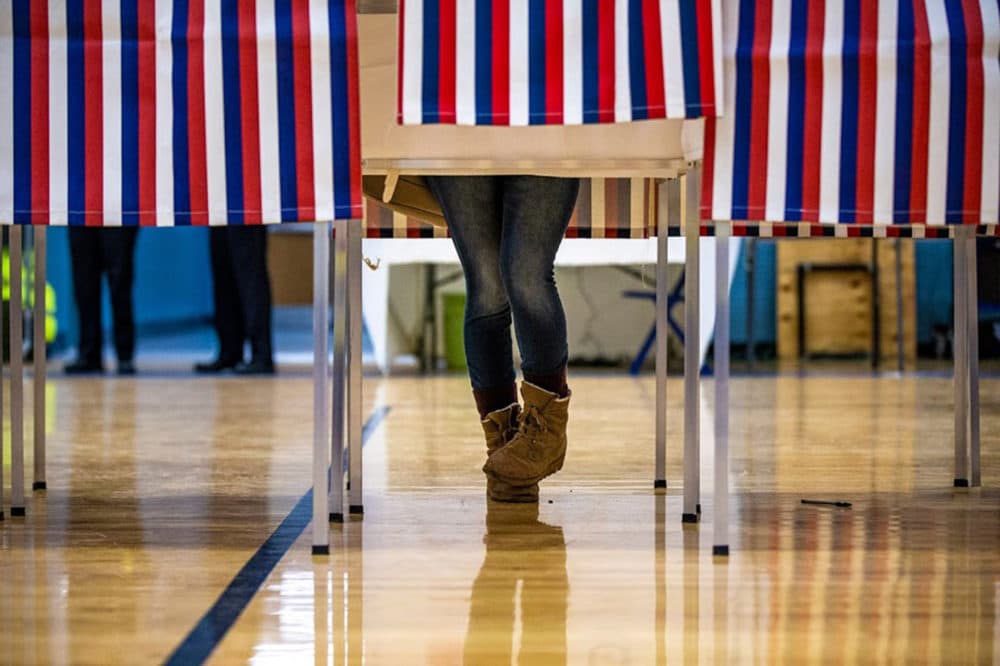Advertisement
Should N.H. Still Be First In The Nation? Some Voters There Say It's Time For A Change

After the chaotic Iowa caucuses and last week's New Hampshire primary, which saw the winnowing of all but one of the minority candidates from the Democratic presidential race, the question of whether these two majority-white states deserve to lead off the Democratic nominating process remains.
The top contenders are now Bernie Sanders, Pete Buttigieg, Elizabeth Warren, Joe Biden and Amy Klobuchar. While the next two primary contests will be held in the more diverse states of Nevada and South Carolina, all black and Latino candidates have already dropped out of the race.
"What’s clear is that the Democratic party needs to put an end to the Iowa-New Hampshire sequence as first in the nation, because it’s so not representative," says Bina Venkataraman, editorial page editor for the Boston Globe.
The Globe editorial board opted not to endorse any candidate ahead of the New Hampshire primary, and is calling instead for a rotating cast of more diverse states to vote first. Take Illinois, for example, where the age, racial makeup and economic profile of the population is a much closer representation of the nation at large.
"The median age of the country is much lower than the median age of New Hampshire, which is 43.1," says Venkataraman. "It's true also if you look across racial demographics: the country has about triple the percentage of Latinos that New Hampshire and Iowa have."
The Globe editorial board is also calling for several states to vote simultaneously on the first primary day, thereby defusing the symbolic power and outsize attention granted to the solo contests in Iowa and New Hampshire every four years.
But how likely is it that Iowa and New Hampshire, which have gone first for decades, could actually lose that status?
"You have a lot of dissatisfaction in the Democratic party in terms of how this nomination process works," says Karthick Ramakrishnan, a professor of political science and public policy at the University of California, Riverside. "I think there’s going to be tremendous pressure within the Democratic party to try to change that."
A lot of this pressure comes from the perception that super-rich candidates like Tom Steyer or Michael Bloomberg could buy their way into the nomination, Ramakrishnan says. So the outcome of the nominating process, and the general election, may have a lot to say about whether the primary state sequence is ultimately rearranged.
Advertisement
"If Donald Trump or Michael Bloomberg end up winning, you're gonna see a lot of pressure to change this," he says. "But if Pete Buttigieg or Bernie Sanders win the presidency, I don't know how much you'll see them trying to change the status quo, because they will have benefited from that."
Niambi Carter, a professor of political science at Howard University in Washington, D.C., is doubtful the primary system will change in four years.
"The Democratic Party has had signs for a very long time that Iowa and New Hampshire perhaps shouldn't be first in the nation," Carter says. "Yet, instead of changing it, they simply allowed Nevada and South Carolina to go earlier. I think it's just a little Band-Aid on what is becoming a larger issue about representation within the party."
Changing the order of the primary contests is also an issue complicated by state law: Iowa law dictates that Iowa must be the first-in-the-nation caucus state; New Hampshire law says it must hold the first primary.
Yet Carter says it is perfectly within the party’s power to devalue New Hampshire and Iowa’s convention delegates, should they choose not to play along with a hypothetical new primary schedule laid out by the Democratic National Committee.
"We know rules changes can happen, they happen all the time," she says. "It’s just a matter of whether they have the political will."
Others see no reason to change things.
Ray Buckley, chair of the New Hampshire Democratic Party, argues the entire country is represented by the early voting states.
"This is the fourth cycle that we’ve had four early states: Iowa, New Hampshire, Nevada and South Carolina, having the four regions of the country being represented in states where there is still human interaction between the candidates and the people," Buckley says. "We’ve had a 100-year tradition here of having the primary. And I believe that we do it very well."
But even some New Hampshire voters say they're open to a change in tradition. WBUR sat down with two such residents on the eve of the 2020 New Hampshire primary:
“This is blasphemy to my friends up here and I may regret this," says Al Cantor, a self-employed consultant to nonprofits living in Concord. "But if the New Hampshire primary faded away and the responsibilities were rotated among other small states, I would support it because I think it may get us a better, and more representative candidate."
“I agree with Al 100%," says Elizabeth Sides, a housewife in Hopkinton. "New Hampshire is not representative, and I think if we rotate, that’s a good thing for the country, actually."
This segment aired on February 14, 2020.

